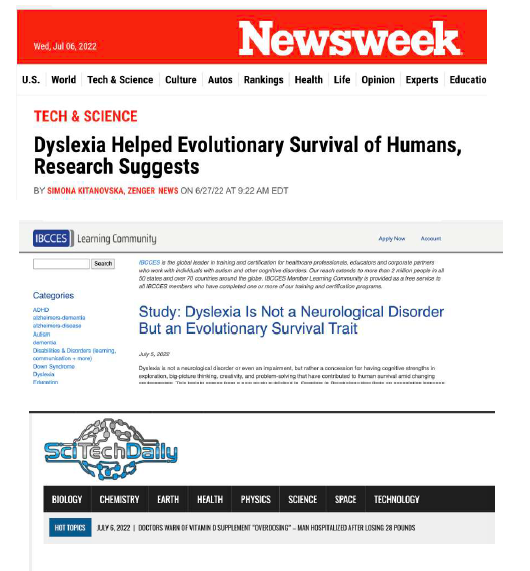 Dyslexia is not a neurological disorder or even an impairment, but rather a concession for having cognitive strengths in exploration, big-picture thinking, creativity, and problem-solving that have contributed to human survival amid changing environments.
Dyslexia is not a neurological disorder or even an impairment, but rather a concession for having cognitive strengths in exploration, big-picture thinking, creativity, and problem-solving that have contributed to human survival amid changing environments.
This insight comes from a new study published in Frontiers in Psychology that finds an association between the learning difference and “an explorative bias.”
— Additude Magazine, on the recent paper by Taylor and Westergaard
Cambridge scholars Helen Taylor and Martin David Vestergaard are shaking up the world with their article, Developmental Dyslexia: Disorder or Specialization in Exploration? In just a week, the article already had more views that 98% of all Frontiers articles.
I’ve begun to a do a deep dive in our Premium magazines, but one of the reasons this comprehensive analysis is so satisfying is that it goes both deep and wide in dyslexia literature – something that too many researchers and clinical experts haven’t been able to do. It also puts forth a compelling theory that dyslexia has an essential importance to humankind because dyslexic people have exploratory strengths that can help our species adapt to changing conditions and find ways to thrive.
From the paper:
“Developmental dyslexia is defined as “a disorder in children who, despite conventional classroom experience, fail to attain the language skills of reading, writing and spelling commensurate with their intellectual abilities” (World Federation of Neurology, 1968)… this long-standing deficit-centric view provides an incomplete picture…Nearly forty years ago, Norman Geschwind noted an increasing number of studies suggesting that those with Developmental
Dyslexia have superior talents in certain non-verbal skills that relate to art, architecture, engineering, and athletics. He was first to highlight a likely evolutionary basis for the differences observed…”
After an exhaustive broad and deep analytical review of diverse scholarly literature, the authors come to these conclusions:
“The explorative bias for people with Developmental Dyslexia can be seen at multiple levels of analysis. Proposed strengths cluster around explorative behaviors such as big-picture, long-term thinking, and inventiveness.”
If you are academically-inclined, do read this paper for its outstanding and compelling analysis of the data regarding dyslexia.
A wide-spread problem in the field of dyslexia is the existence of silo-ed expertise. Reading specialists may not study and deeply understand dyslexia from anything other than a reading perspective (including writing, memory, mathematics, foreign languages learning, etc.), and scientists who conduct basic scientific research may be removed from dyslexia from educational or clinical perspectives – certain over the course of the life span.
But having both wide and deep knowledge of dyslexia is just what this field and this community needs!
To date, we’ve often found the people who understand dyslexia the best have had a personal connection to dyslexia themselves, and then received additional training in neuroscience, psychology, education or understand more deeply and help others.
Our hope is that academia will look more deeply into the implications of this work so that it can become the foundation for a better education for all dyslexic students in K-12 and higher education.















